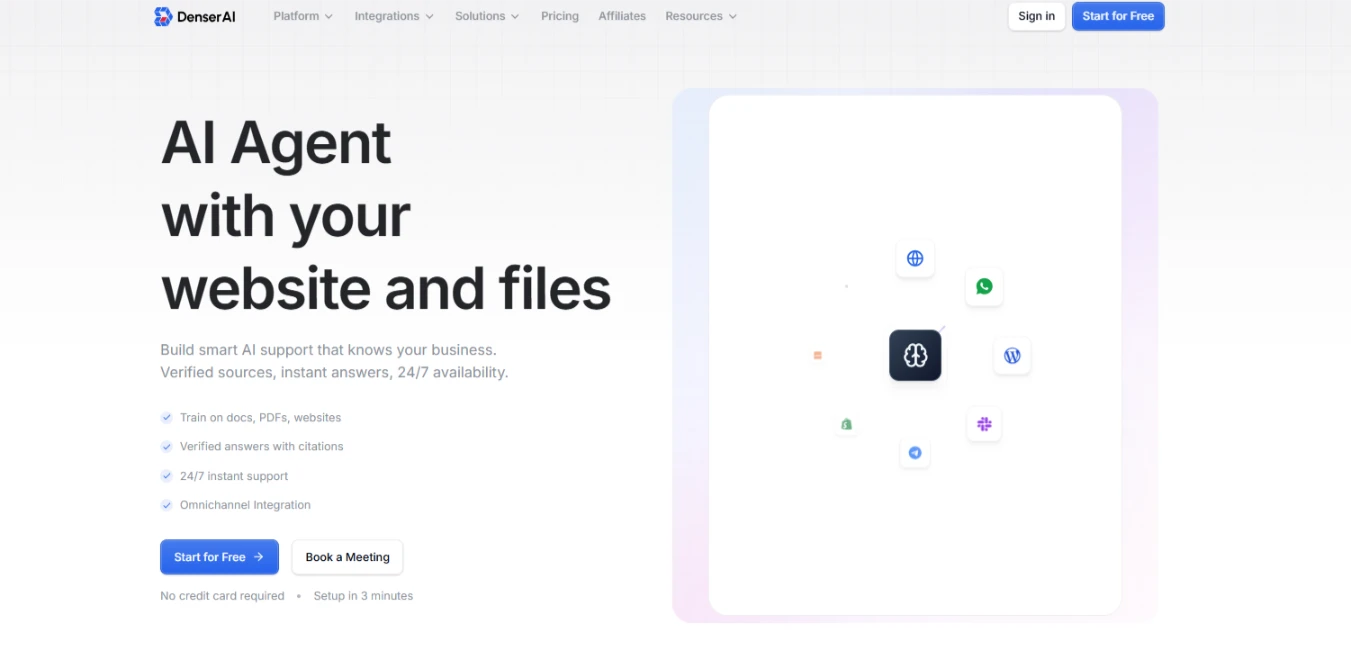
10 Best AI Chatbot Solution Providers for Enterprise in 2025

AI chatbot solutions have evolved from basic FAQ bots to intelligent platforms that deliver human-like conversations, automate complex workflows, and integrate seamlessly with enterprise systems. According to Gartner, organizations using AI chatbot solutions report up to 70% reduction in call, chat, and email inquiries.
But not every AI chatbot solution delivers the same results. Many businesses struggle with complicated setups, bots that sound robotic, or platforms that don't integrate well with their existing tech stack.
Choosing the right AI chatbot solution provider can mean the difference between frustrated customers and a scalable, always-on support system that drives growth.
In this guide, we compare the 10 best AI chatbot solution providers for 2025—covering features, pricing, pros and cons—so you can find the right fit for your business. With the right AI chatbot solution, you'll reduce operational costs, improve customer satisfaction, and scale support without adding headcount.
How AI Chatbot Solutions Drive Better Business Results#
Customer expectations have fundamentally changed. Phone calls and day-long email response times no longer satisfy people who want answers immediately.
According to Salesforce, 83% of customers expect to interact with someone immediately when contacting a company. Meeting that expectation consistently is impossible for any human team alone—which is exactly why AI chatbot solutions have become essential.
24/7 Availability Without Added Headcount#
AI chatbot solutions make round-the-clock, on-demand support possible without overloading your team. Whether a customer reaches out at 2 AM or during peak hours, they get instant responses. Many AI chatbot solution providers also offer free plans so teams can get started without upfront investment.
Automation of Repetitive Tasks#
Beyond availability, AI chatbot solutions handle repetitive tasks that consume valuable staff time—answering FAQs, routing inquiries, collecting information, and processing simple requests. This frees your team to focus on complex, high-value conversations that require human judgment.
Lead Generation and Sales Acceleration#
Modern AI chatbot solutions do more than solve problems. They actively drive growth by guiding customers toward products, qualifying leads for sales teams, scheduling meetings, and integrating with CRM systems to automate the entire pipeline. The best AI chatbot solutions turn every conversation into a potential revenue opportunity.
Security and Compliance in AI Chatbot Solutions#
When evaluating AI chatbot solution providers, security and compliance should be at the top of your checklist. As AI chatbot solutions increasingly handle sensitive customer data—from personal details to payment information—businesses must ensure their providers meet enterprise security standards.
Essential Security Features#
Look for AI chatbot solutions that offer:
- Data encryption: End-to-end encryption for data in transit and at rest
- Access controls: Role-based permissions and granular user management
- Secure authentication: SSO, MFA, and audit logging for enterprise deployments
- Data anonymization: PII protection and automatic data masking
Compliance Certifications#
Leading AI chatbot solution providers prioritize compliance with global regulations including GDPR, HIPAA, CCPA, and PCI-DSS. Enterprise-grade platforms typically hold SOC 2 Type II or ISO 27001 certifications, demonstrating commitment to security best practices.
By selecting an AI chatbot solution that takes security seriously, you protect your business, maintain customer trust, and avoid costly compliance violations.
10 Best AI Chatbot Solution Providers in 2025#
We've evaluated the leading AI chatbot solution providers based on AI capabilities, ease of use, integration options, pricing, and customer reviews. Here are the top 10 platforms to consider for enterprise and business deployments:
1. Denser#
Denser is an AI agent and chatbot platform that stands out for its deep integration capabilities and enterprise-grade intelligence. It allows you to create AI chatbots that learn from your own websites and documents to deliver instant, accurate answers with source citations, generating reliable chatbot responses based on your data.

Denser's solution uses retrieval-augmented generation (RAG) combined with generative AI to make sure responses are grounded in your data.
The bot confidently answers complex queries when you chat with PDFs or uses verified information from knowledge bases and other uploaded content.
The platform requires no-code setup and chatbot deployment that takes as little as three minutes. Even non-technical teams can train a custom AI support agent and start engaging customers 24/7. Advanced AI training techniques are available to further improve the chatbot's responsiveness and accuracy.
Denser offers a rich set of features built for scalability and flexibility. You can create a highly customized chatbot tailored to your specific business needs. The chatbot supports omnichannel deployment so that you can integrate it across your website, customer portals, or messaging apps.
It can handle thousands of pages or large document sets, thanks to a scalable AI architecture that maintains high accuracy even as your knowledge base grows. It also connects with popular business tools out of the box to enable automated workflows that streamline business processes across your ecosystem.
Because Denser's AI provides 24/7 instant support, you can handle customer inquiries around the clock without additional staff.
Denser is a top choice with its powerful AI that delivers context-aware answers and supports integration within various business processes to help organizations scale efficiently. Sign up for a free trial or schedule a demo to explore Denser today!
2. Intercom#
Intercom is a customer support platform that offers AI chatbots alongside live chat and helpdesk tools. Its Fin AI Agent can automatically resolve complex customer questions by using a company's knowledge base, chat history, and historical support data.
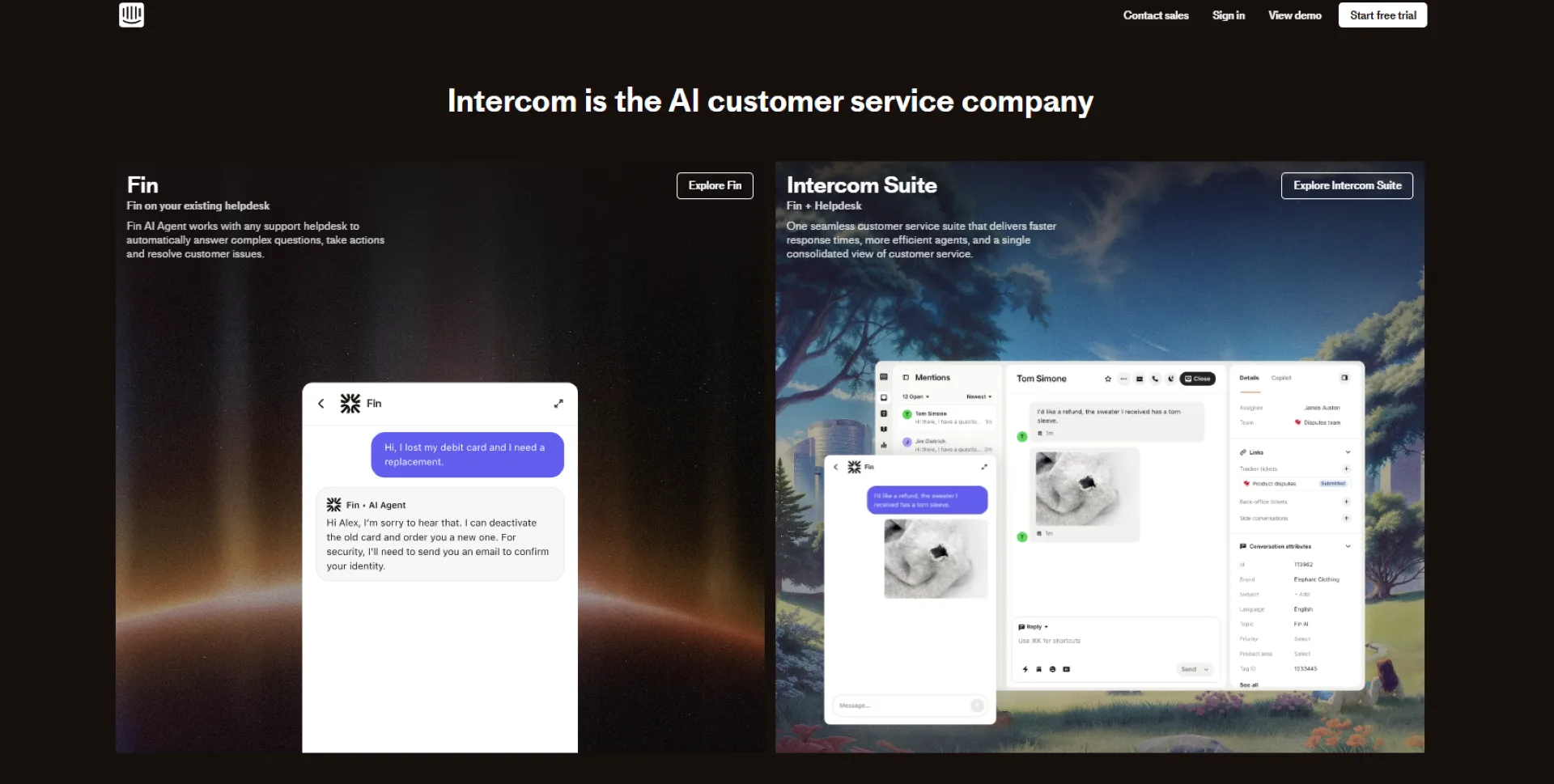
Image Source: intercom.com
It provides a visual builder that lets customer service teams design conversational workflows in minutes, using an intuitive, drag-and-drop interface to set up rules or questions for the chatbot.
Intercom's chatbots work hand-in-hand with its helpdesk. The customer service bot can greet users on your website or in-app, answer common questions, collect information, and seamlessly hand off the conversation to a live agent for complex queries. Intercom supports live agents working alongside chatbots, allowing chat conversations to be efficiently transferred to live agents to improve customer service workflows.
However, cost can be a concern, and its pricing tends to increase as your business and volume grow.
Users have found the Fin AI add-on expensive, with usage-based charges that can add up. Larger teams sometimes report that fully unlocking Intercom's many features requires higher-tier plans.
3. Drift#
Drift is a conversational AI platform used for marketing and specializes in turning website visitors into a sales pipeline by engaging them in real time.
Now part of Salesloft, Drift's advanced AI bot focuses on personalizing outreach on your site and connecting qualified leads with your sales team.
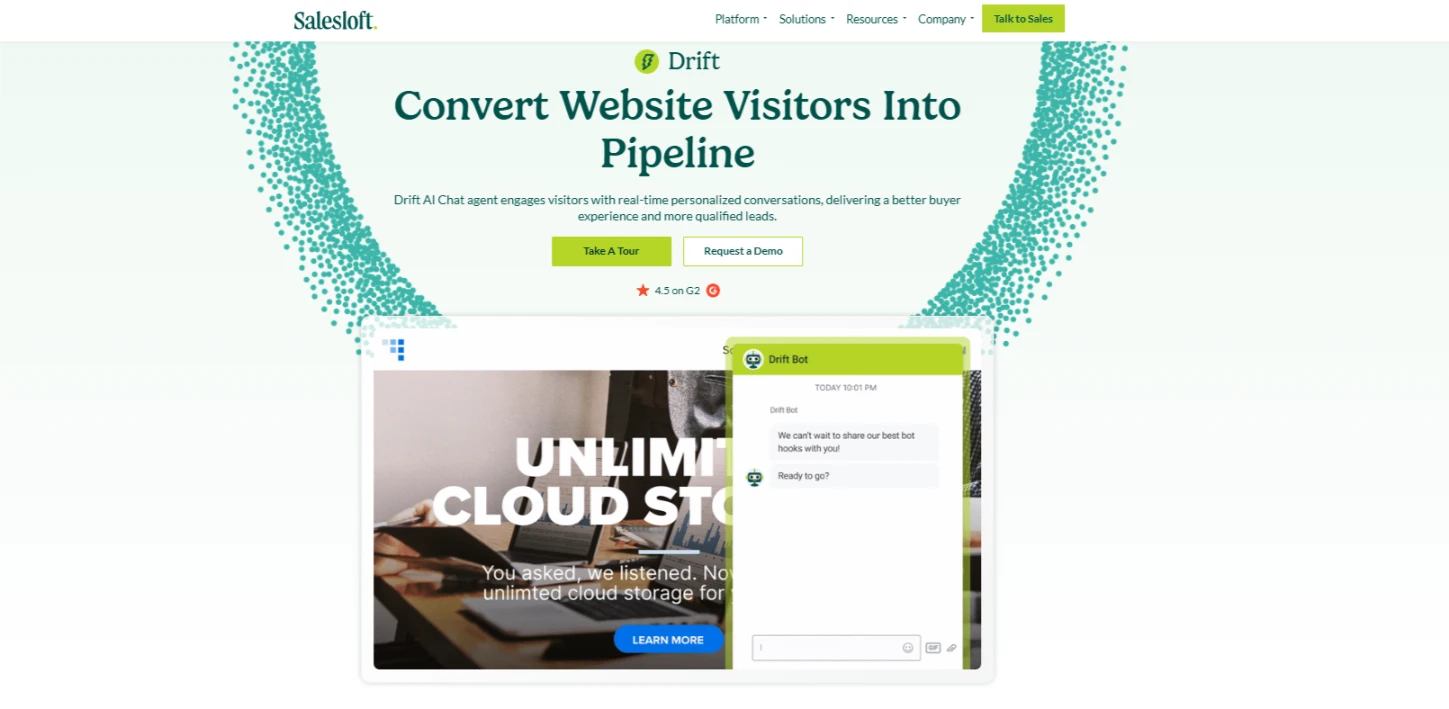
Image Source: salesloft.com
It uses an AI bot to greet visitors with real-time, personalized responses, rather than static forms. The platform can recognize anonymous website visitors by firmographic data and their user behavior on your site.
Drift also scores visitor engagement in real time and delivers the conversation tailored to their context. Once a conversation starts, Drift integrates with your CRM and existing business systems to make sure any qualified lead is routed instantly into the sales workflow. Drift's AI bots help automate and optimize sales processes by qualifying leads, scheduling meetings, and streamlining engagement, making your sales team more efficient.
Some users have reported that Drift's platform can be challenging to master fully, given its rich feature set. Also, some users have noted frustrations with certain limitations, such as a lack of custom reporting features and fewer out-of-the-box integrations than they expected.
4. Tidio#
Tidio is a chatbot software and live chat platform that combines AI chatbots, live chat, and support across multiple channels.
Tidio's AI-powered customer support chatbot called Lyro can automatically answer common questions and perform tasks by integrating with your backend systems. It is highly effective at answering questions instantly and accurately, providing customers with immediate, reliable responses.
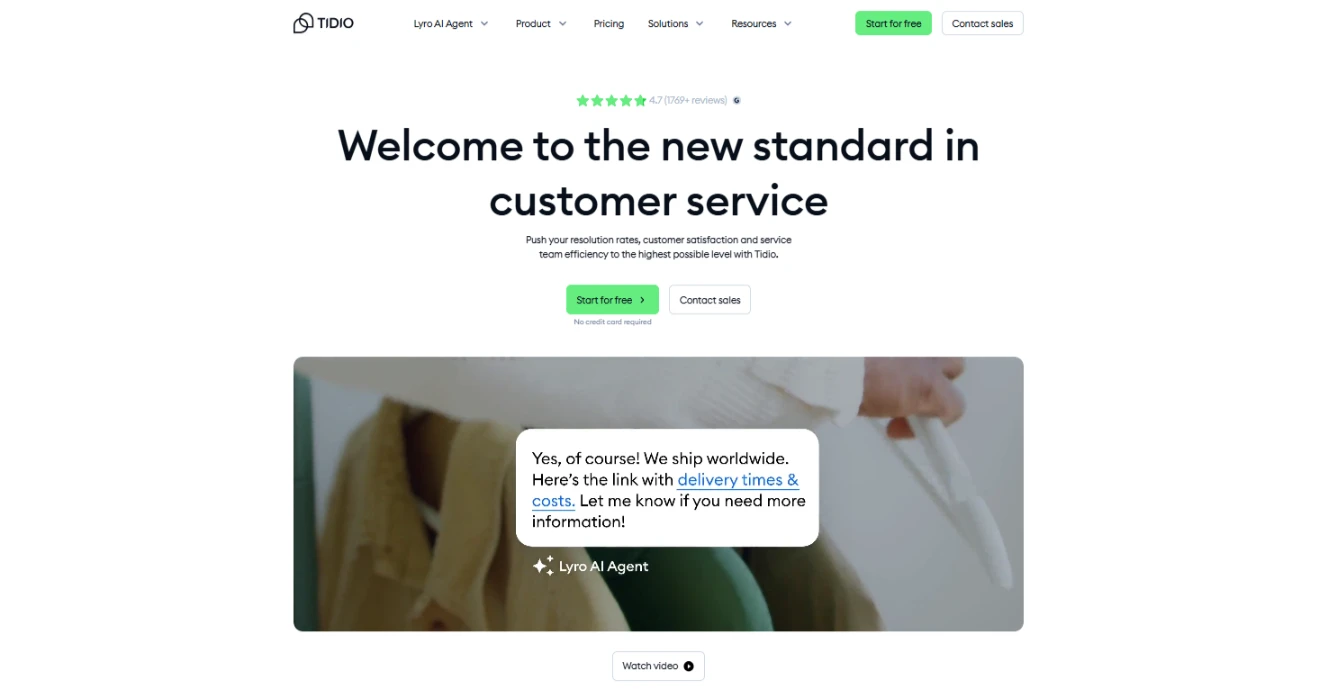
Image Source: tidio.com
The platform provides a visual builder called Flows that lets you craft conversation scenarios with triggers and actions without any coding. You can use this no-code editor to create everything from a simple FAQ bot to a more complex lead generation funnel.
It integrates natively with platforms like Shopify, WooCommerce, and Wix, allowing the chatbot to pull order data or product info to assist customers in real time. The platform supports multiple communication channels out of the box.
But, Tidio users have pointed out that some advanced features are only in the higher-tier plans, and the costs add up if you have a large volume of interactions. Certain customization options or integrations also may be less robust than those of enterprise competitors.
5. Zendesk#
Zendesk is customer support software that offers an AI-powered chatbot as part of its suite. Zendesk's Answer Bot is a customer support chatbot designed to automate customer service functions by automatically handling common customer questions using your knowledge base content.
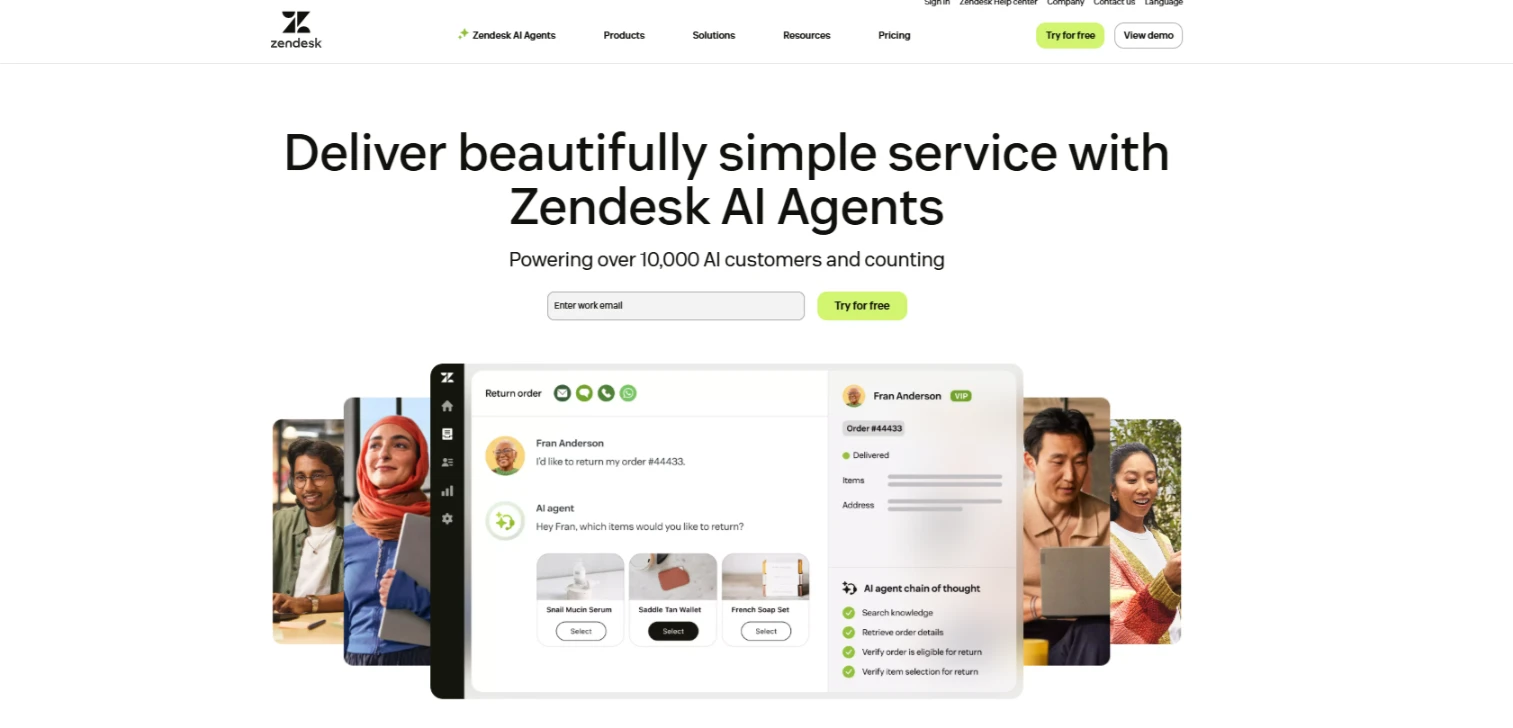
Image Source: zendesk.com
The bot can reply to inquiries with relevant help center articles or information to deflect simple tickets before they reach an agent.
The bot is built into Zendesk Guide, so once your FAQs are in place, it can start suggesting those answers to customers via web chat or email without heavy setup.
Zendesk's chatbot capabilities also include robust chatbot features such as a flow builder and advanced AI for managing nuanced customer interactions. The bot flow builder enables you to create guided conversation trees to help customers self-serve, and supports customization options for different use cases.
However, if you're looking for a sales or marketing chatbot, you might find Zendesk's chatbot less tailored to proactive engagement or lead generation. One analysis noted that Zendesk's bot is very support-first and not as sales-focused in its approach.
6. ManyChat#
ManyChat is a chatbot platform focused on marketing, sales, and engagement on social media channels. You can automate two-way conversations on Instagram, Facebook Messenger, WhatsApp, and SMS to grow your audience and drive sales. ManyChat enables users to build chatbots for various messaging channels with ease.
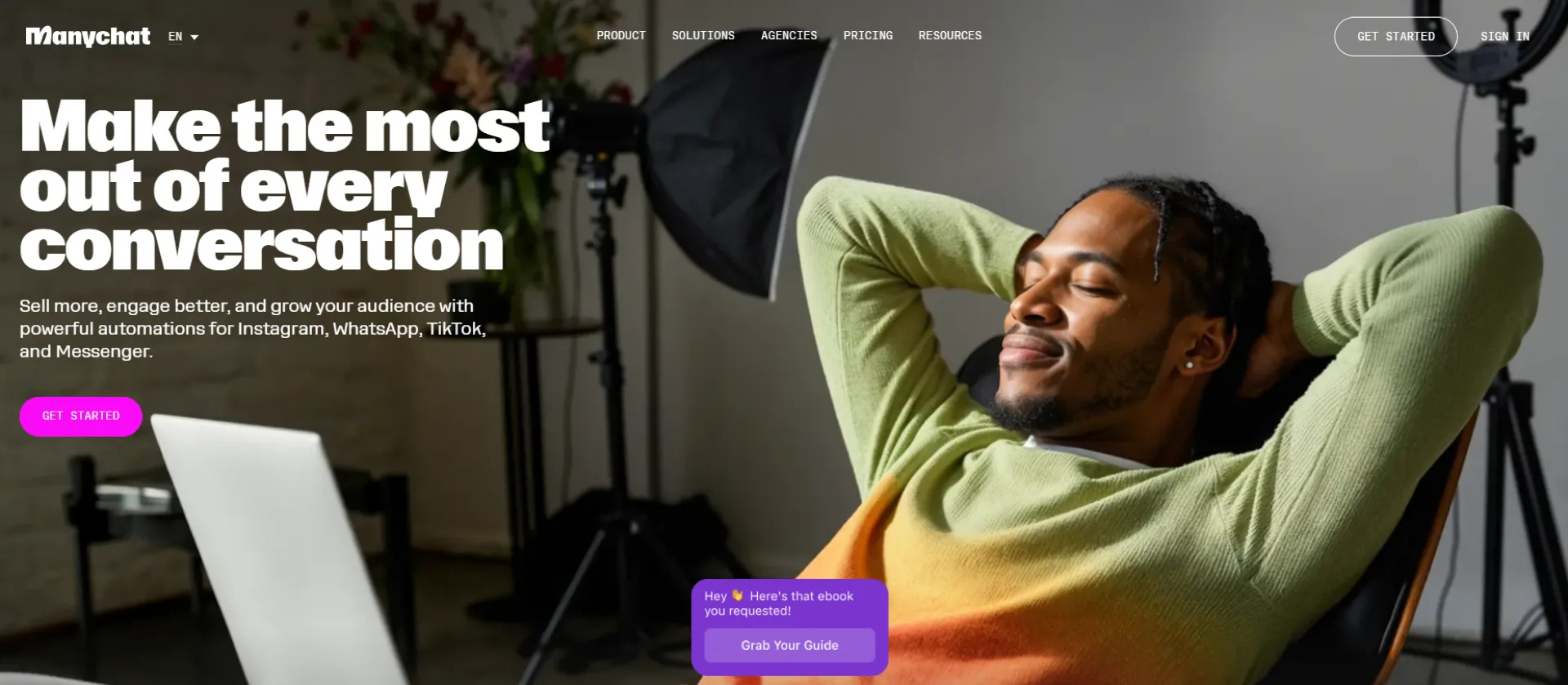
Image Source: manychat.com
It provides a set of templates and pre-built quick-start flows as well, so marketers can launch campaigns like contests, FAQ bots, or product recommendation quizzes. ManyChat also offers resources and tools for bot builders and chatbot builders, making it easy to create customized or branded chatbots without coding.
It can connect to Shopify to send cart abandonment reminders through Messenger or WhatsApp with item details and discount codes.
But, ManyChat's basic features are free for small pages, but to use it with a substantial audience or to unlock advanced features like certain AI capabilities or higher message volumes, you need to upgrade.
There have also been comments about limits on features in lower tiers, such as capped broadcasting or the number of custom flows, which can be frustrating and push users towards higher plans.
7. Ada#
Ada is an AI chatbot platform designed for enterprise clients seeking scalable, AI-driven customer service solutions. It can autonomously resolve a large percentage of customer inquiries through AI to reduce support workload.
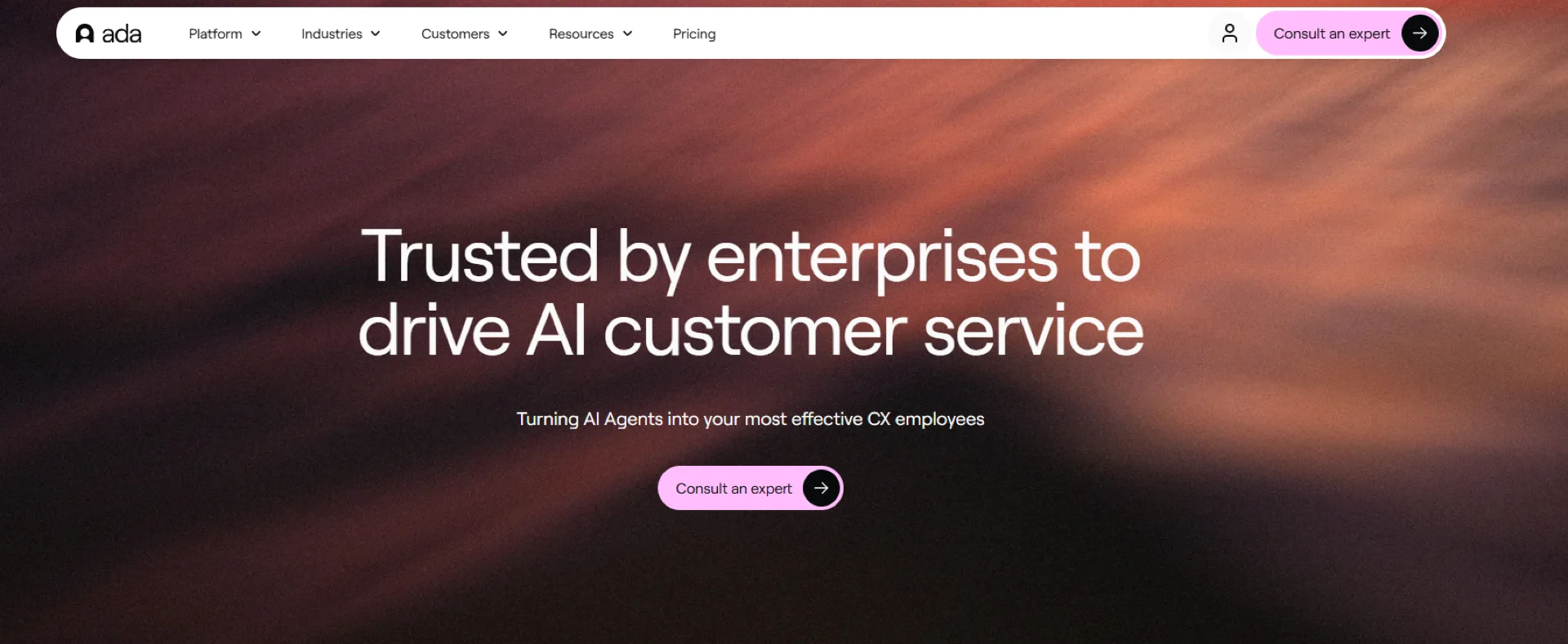
Image Source: ada.cx
The platform provides a single, omnichannel platform to build and manage virtual agents that automate support tasks across chat, voice, email, and social channels.
With Ada, you can design conversational experiences, and the bot can reference customer data from integrated systems to give tailored responses. Ada leverages ai based chatbots to analyze interactions and improve responses over time, enhancing customer service strategies.
One consideration is that Ada is aimed towards larger organizations and comes with a corresponding price tag. Enterprises often involve solution engineers or dedicated bot managers to get the most out of the platform.
It may also not focus as much on sales chatbots or on providing out-of-the-box lead gen templates that some other platforms have.
8. Chatfuel#
Chatfuel is a chatbot builder used for creating Facebook Messenger bots. As a Meta official partner, it's been used as a marketing and sales chatbot platform for ecommerce.
With Chatfuel, you can design flows using a blocks-based, no-code builder. This empowers chatbot builders to create custom chatbots tailored to specific business needs, using prebuilt templates and flexible branding options. Businesses can automate customer support by setting up product finders and interactive menus without technical expertise. For many companies, this helps improve customer conversations.
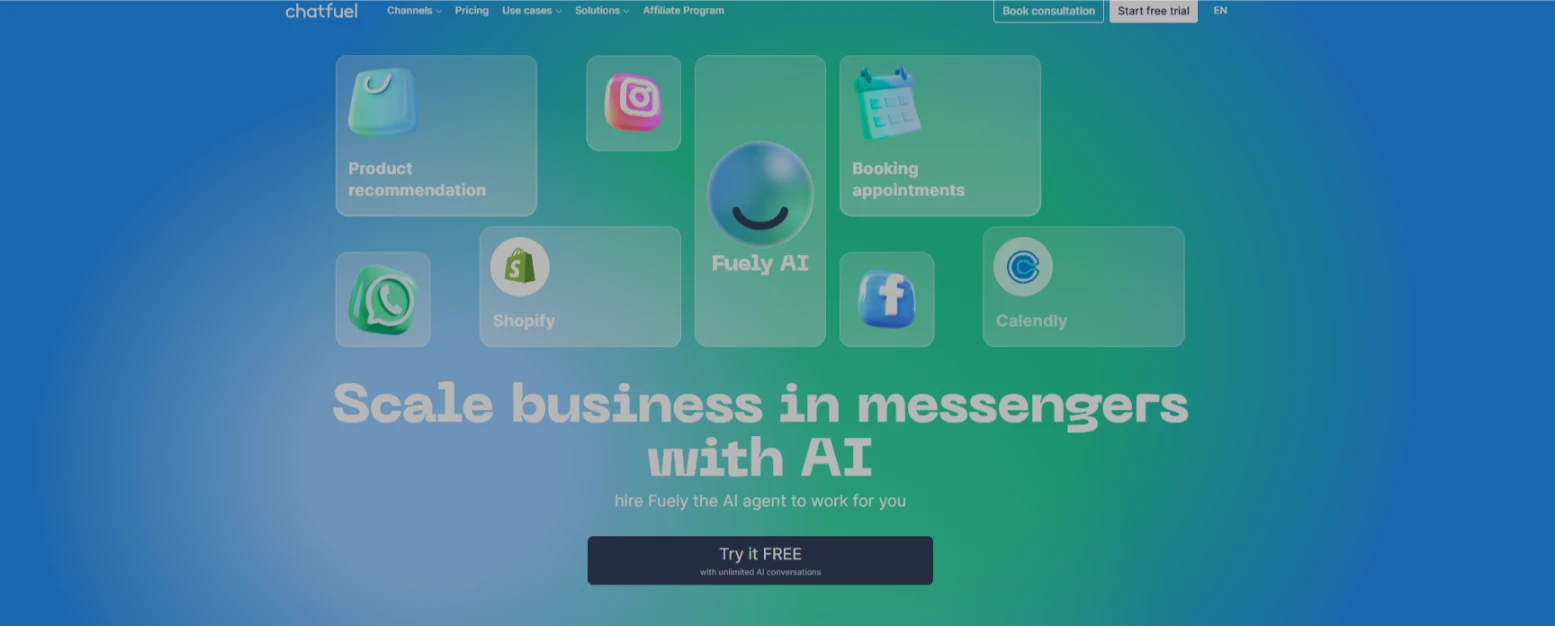
Image Source: chatfuel.com
Chatfuel can provide a website chat widget that uses Messenger in the backend. Visitors to your site can chat via the Facebook ecosystem, and you can follow up with those users later in Messenger. Chatfuel also supports deployment across multiple messaging platforms, enabling seamless customer engagement and consistent experiences across web, mobile, and social channels.
However, Chatfuel's plans often charge based on the number of subscribers or the number of pages the bot is deployed to.
Users have noted that, while Chatfuel works well for structured flows, it has fewer built-in functions than competitors and less capability to create personalized customer experiences.
9. Freshchat#
Freshchat is an AI-powered messaging platform from Freshworks that combines live chats, chatbots, and multi-channel communication. As a chatbot app with advanced conversational features, it is powered by Freddy AI, and its bots are designed to boost customer engagement and customer service for businesses of all sizes.
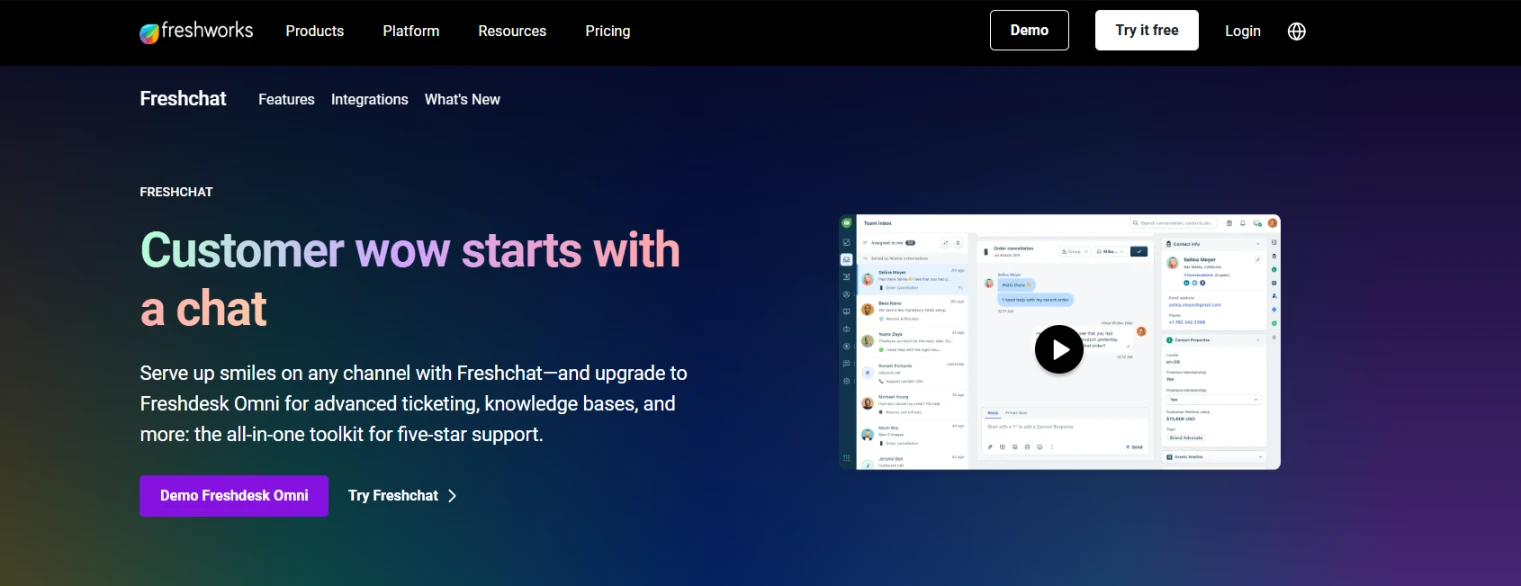
Image Source: freshworks.com
The platform allows you to build bots without code using natural language prompts. It integrates across web, messaging apps, and Apple Business Chat for improved customer experience. Freshchat also offers multilingual capabilities, supporting conversations in multiple languages to serve a diverse, global audience.
Some users note that certain advanced chatbot functions may not be as flexible as specialized AI chatbot platforms. Its out-of-the-box NLP might struggle with complex inquiries unless properly trained, and it may rely on having good knowledge base articles to pull answers from.
There's a sentiment that Freshchat's AI isn't the top of the line in understanding free-form queries compared to some dedicated AI bot services.
10. Landbot#
Landbot is a no-code chatbot builder that helps you create conversational landing pages. You can build chatbots for web, WhatsApp, and Messenger without any coding expertise, making it easy to deploy solutions across multiple channels and industries.
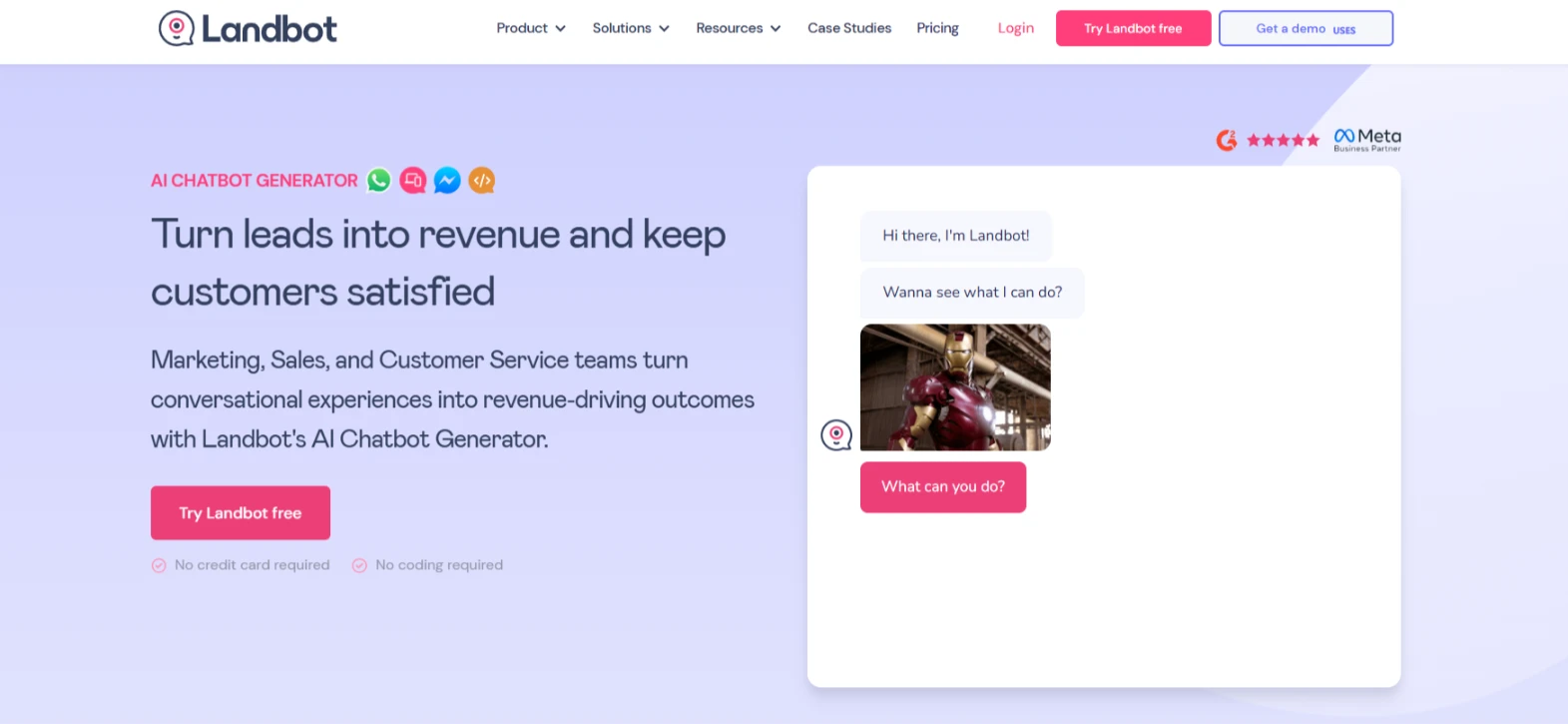
Image Source: landbot.io
It supports rich content and widgets in these chats, so the chatbots look and feel interactive and fun for the user.
The user friendly platform also allows embedding bots in websites or running them as standalone landing pages. For WhatsApp bots, it's an official provider that helps you set up a WhatsApp Business API chatbot.
With Landbot's recently introduced AI features, you can now incorporate AI-powered agents into your flows. Landbot's AI Agent generator lets you connect the bot to an AI model and your own data so that it can handle free-form questions in a smart way. Landbot supports multiple languages, enabling businesses to serve international audiences and provide global customer support.
Landbot's specialty has been its structured flow bots. Its AI answer quality may not be as naturally fluent or context-aware as a dedicated AI chatbot platform that focuses purely on NLP. Its pricing is generally reasonable for the value.
Types of AI Chatbot Solutions Offered by Providers#
Different AI chatbot solution providers specialize in various approaches. Understanding these categories will help you choose the right fit for your business needs and use cases.
When evaluating AI chatbot solutions, consider essential features like NLP capabilities, voice integration, omnichannel deployment, and customization options. The best AI chatbot solutions function as intelligent virtual agents—automating support tasks, integrating with CRM systems, and delivering context-aware conversations across all channels.
Rule-Based Chatbots#
Rule-based chatbots operate on predefined rules, decision trees, or keyword triggers. They scan for keywords and follow scripted paths to provide answers.
Best for: FAQs, guided flows, menu-driven options, and simple automation. Rule-based chatbots require no coding expertise, making them accessible to non-technical teams as a first step into chatbot automation.
Limitation: Cannot understand complex or unexpected queries outside their scripts. If a customer phrases a question differently than expected, the bot may fail to respond correctly.
AI-Powered Chatbots#
AI-powered chatbots use natural language processing (NLP) and machine learning to understand user intent and context—not just keywords.
Best for: Complex queries, multi-step processes, and scenarios requiring continuous learning. These AI chatbot solutions interpret what customers ask in their own words and generate accurate, conversational responses.
For example, an AI-powered chatbot can recognize when a customer asks about "upgrading a plan" even if that exact phrase doesn't exist in its training data.
AI chatbot solution providers like Denser excel in this category by combining powerful NLP with enterprise integrations and no-code deployment. Sign up for a free trial or schedule a demo to experience one of the best AI chatbot solutions available.
Hybrid Chatbots#
Hybrid chatbots combine rule-based precision with AI intelligence—following structured flows when needed while switching to AI for open-ended questions.
Best for: Businesses that need both predictable workflows (like troubleshooting guides) and flexible AI handling for unexpected queries. A user asking for store hours gets a quick rule-based reply, while someone asking about custom product configurations receives an AI-generated response from your knowledge base.
Voice Chatbots#
Voice chatbots enable spoken interactions through phone systems, mobile apps, and smart devices like Alexa and Google Assistant.
Best for: Healthcare, finance, retail, and any industry where verbal communication improves accessibility. Voice-enabled AI chatbot solutions can handle appointment scheduling, account inquiries, and customer support through natural conversation.
Consideration: Voice AI requires advanced speech recognition to deliver natural interactions. Poor audio recognition frustrates users—choose providers investing heavily in voice accuracy.
Industry-Specific AI Chatbot Solutions#
Industry-specific AI chatbot solutions are tailored to unique workflows, compliance requirements, and customer expectations of particular sectors.
- Healthcare: AI agents in healthcare schedule appointments, send medication reminders, and answer patient questions while maintaining HIPAA compliance
- Financial services: AI used in fintech powers chatbots for balance checks, secure transactions, and real-time fraud alerts
- E-commerce: AI chatbot for ecommerce handles product recommendations, cart recovery, order tracking, and personalized shopping assistance
Measuring AI Chatbot Solution Success#
To maximize ROI from your AI chatbot solution, you need to track the right metrics. The best AI chatbot solution providers include built-in analytics and reporting tools for continuous optimization.
Key Metrics to Monitor#
| Metric | What It Measures | Why It Matters |
|---|---|---|
| Resolution Rate | % of conversations resolved without human intervention | Measures true automation effectiveness |
| Escalation Rate | % of conversations requiring human handoff | Identifies gaps in chatbot capabilities |
| CSAT Score | Customer satisfaction with chatbot interactions | Direct feedback on experience quality |
| First Response Time | Time to first chatbot response | Speed impacts customer satisfaction |
| Containment Rate | % of inquiries fully handled by the chatbot | Core ROI metric for AI chatbot solutions |
Continuous Optimization#
By analyzing these metrics, you can refine conversation flows, identify training gaps, and improve response accuracy over time. The best AI chatbot solutions learn from every interaction—but human oversight ensures they continuously improve in the right direction.
Why Denser Is the Best AI Chatbot Solution for Enterprise#
Too many AI chatbot solutions sound robotic or fail on simple questions. Denser takes a different approach—combining advanced RAG-powered AI with your own business knowledge to deliver accurate, human-like conversations.
Here's what sets Denser apart from other AI chatbot solution providers:
Answer Accuracy with Source Citations#
Unlike chatbots that guess or hallucinate, Denser provides verifiable answers with source citations. Every response links back to the specific document, webpage, or knowledge base article it came from—so customers and teams can trust the information. This transparency builds credibility and reduces the risk of misinformation that plagues many AI chatbot solutions.
Lead Generation That Actually Converts#
Denser isn't just a support tool—it's a pipeline engine. The AI identifies high-intent visitors, captures key details, qualifies leads in real-time, and routes them to sales. Every conversation becomes a potential revenue opportunity.
24/7 Enterprise-Grade Support#
Support that sleeps is support that loses. Denser's customer service chatbots provide round-the-clock reliability for complex B2B relationships. With enterprise-grade security and seamless human handoff, you serve global clients without missing a beat.
Deep System Integration#
The best AI chatbot solutions strengthen your existing systems—not create silos. Denser integrates with CRM, ERP, helpdesk, and sales tools to automate workflows and unify data. Ask about order status? The bot pulls from your ERP and answers instantly.
Scalability Without Quality Loss#
As conversation volume grows, Denser maintains accuracy and consistency. Built-in multilingual support (80+ languages) ensures global coverage, while enterprise architecture handles thousands of simultaneous conversations without degradation.
Analytics That Drive Improvement#
Every interaction generates actionable insights. Denser's advanced analytics show where prospects drop off, which flows need refinement, and how satisfaction trends over time—turning conversations into competitive intelligence.
Get Started with the Best AI Chatbot Solution Today#
Traditional chatbots fail because they rely on scripts, miss context, and frustrate customers. Outdated AI chatbot solutions cost you leads and damage the relationships you're trying to build.
Denser represents the next generation of AI chatbot solutions. Instead of rigid scripts, it learns from your business knowledge, integrates with your systems, and delivers accurate, context-aware responses that feel natural.
What you get with Denser:
- No-code deployment in minutes—not weeks
- RAG-powered accuracy grounded in your actual data
- 24/7 lead qualification and customer support
- 80+ language support for global reach
- Enterprise security with SOC 2 compliance
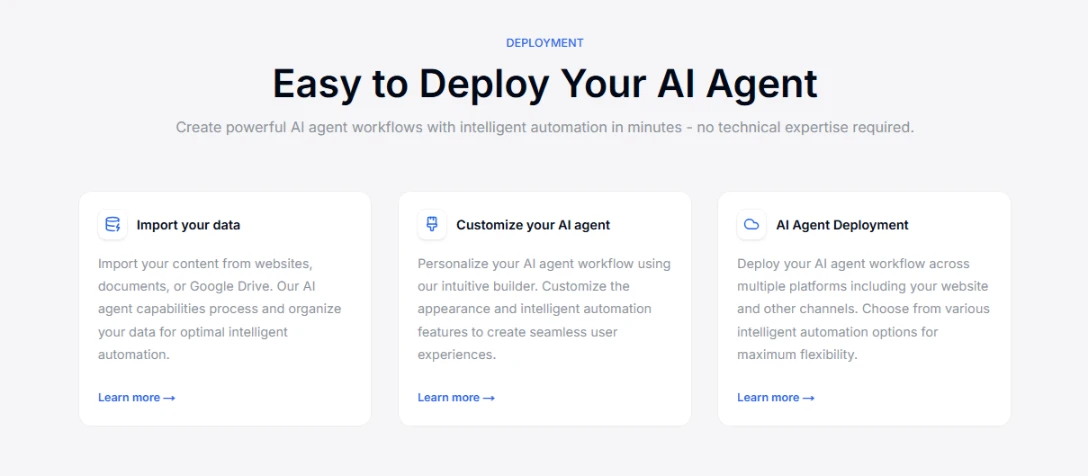
Ready to see why leading enterprises choose Denser over other AI chatbot solution providers? Sign up for a free trial or schedule a demo and turn every conversation into a business opportunity.
FAQs About AI Chatbot Solution Providers#
What is an AI chatbot solution?#
An AI chatbot solution is software that uses artificial intelligence, natural language processing (NLP), and machine learning to automate conversations with customers. Unlike rule-based bots that follow scripts, AI chatbot solutions understand context, learn from interactions, and generate human-like responses. They integrate with business systems (CRM, helpdesk, e-commerce) to handle support, qualify leads, and automate workflows 24/7.
What is the best AI chatbot solution for business?#
The best AI chatbot solution depends on your specific needs—scale, use case, integration requirements, and budget. For enterprises seeking accuracy, deep integrations, and scalability, Denser consistently ranks among the top AI chatbot solution providers. It combines RAG-powered AI with no-code deployment and enterprise security.
For smaller teams or specific use cases, platforms like Tidio (e-commerce), ManyChat (social media marketing), or Intercom (customer support with live chat) may be appropriate starting points. See our comparison above to match your requirements.
How much do AI chatbot solutions cost?#
AI chatbot solution pricing varies significantly by provider and scale:
- Free tiers: Most providers offer limited free plans for testing
- SMB plans: $20-100/month for basic AI chatbot solutions
- Growth plans: $100-500/month for advanced features and higher volumes
- Enterprise: Custom pricing, often starting at $1,000+/month for large-scale deployments
Key pricing factors include conversation volume, number of agents/seats, AI capabilities, and integrations. Some providers charge per conversation or per resolution.
How do I choose the right AI chatbot solution provider?#
When evaluating AI chatbot solution providers, consider:
- AI capabilities: NLP quality, context understanding, learning ability
- Integration options: CRM, helpdesk, e-commerce, and custom API support
- Deployment ease: No-code vs. developer-required setup
- Scalability: Can it handle your growth trajectory?
- Security: SOC 2, GDPR, HIPAA compliance as needed
- Analytics: Built-in metrics and optimization tools
- Pricing model: Predictable costs as you scale
Which AI chatbot solution is better than ChatGPT?#
ChatGPT is a powerful general-purpose LLM, but it's not a complete AI chatbot solution for business. It lacks integrations, analytics, routing, security certifications, and enterprise deployment features.
Purpose-built AI chatbot solutions like Denser combine large language models with enterprise infrastructure—integrations, analytics, human handoff, compliance, and custom training on your data. For business use cases, these purpose-built platforms deliver better results than using ChatGPT directly.
What's the difference between AI chatbot solutions and live chat?#
- AI chatbot solutions: Automated, available 24/7, handle unlimited simultaneous conversations, lower cost per interaction, best for FAQs and routine inquiries
- Live chat: Human agents, limited availability, handle complex/sensitive issues, higher cost per interaction, best for escalations and relationship building
The best approach combines both: AI chatbot solutions handle routine inquiries instantly while seamlessly escalating complex issues to human agents with full context preserved.
Related Reading#
- Best AI Chatbot Solutions for Business — Our comprehensive guide comparing the best AI chatbot solutions in 2026.
- Enterprise Chatbot Solution Types — Explore different chatbot types and implementation strategies for enterprise.
- AI Chatbot Solutions With Advanced Features — Deep dive into RAG, NLP, and generative AI chatbot technologies.